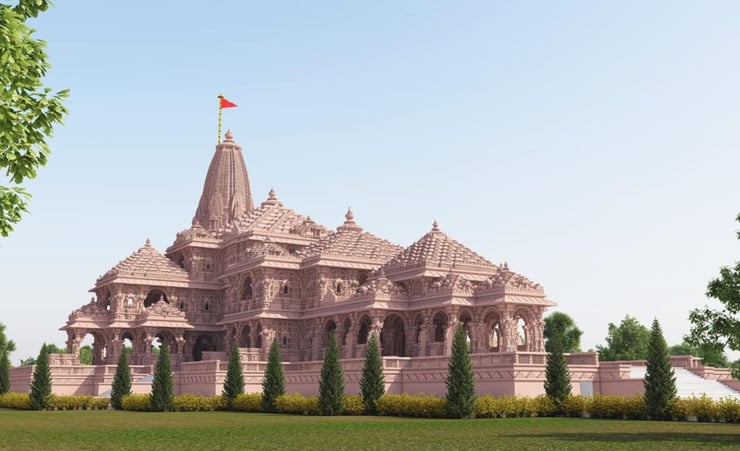Ayodhya calling: NZ devotees prepare for pilgrimage

A group of Hindu temples and organisations in New Zealand is planning a pilgrimage for devotees interested in visiting Shri Ram Janmabhoomi Mandir in Ayodhya, which is scheduled to be inaugurated in January next year.
Officials of Hindu Organisations, Temples, and Associations (HOTA) expect it to be a two-week trip next year, allowing devotees to experience the historic city and other neighbouring towns.
The Ayodhya temple is set to witness its grand inauguration on January 22, 2024. The prana-pratishtha ceremony will mark the installation of the new idol of Lord Rama, depicted in his cherished child form ‘Ramlala’.
Guna Magesan, President of Hindu Council of New Zealand, who recently engaged in organising the World Hindu Congress 2023 in Thailand, is urging the active participation of devotees from New Zealand.
“The main inspiration behind organising a two-week trip to Ayodhya and its neighbouring places is to provide devotees and spiritual seekers with an opportunity to undertake a pilgrimage to one of the holiest cities in Hindu dharma.”
Set to unfold in after mid March but before mid April next year, this transformative itinerary promises to be a unique blend of spiritual exploration, cultural immersion, and personal growth, Magesan says.
The spiritual journey begins in Delhi, immersing devotees in the vibrant energy of the capital. Over the initial two days, participants are scheduled to settle into accommodations strategically selected for proximity to significant sites, exploring awe-inspiring landmarks like Akshardham Temple, Lotus Temple, Qutub Minar, India Gate and Parliament.
From Delhi, the pilgrimage unfolds in the sacred city of Mathura, Lord Krishna's birthplace. Days three and four unravel the spiritual tapestry of Mathura, with devotees visiting Krishna Janmabhoomi, Dwarkadhish temple, and enchanting Brindavan, delving into the divine tales of Lord Krishna.
Ayodhya, the focal point of devotion for Lord Rama, beckons on days five and six. Via train or road, pilgrims embark on a journey to Ram Janmabhoomi, Kanak Bhavan, and Hanuman Garhi, deepening their connection to Hindu mythology.
Days seven and eight bring a contemplative phase in Kashi, Varanasi. Devotees witness mystical ghats along the Ganga, attend soul-stirring Ganga Aarti, explore Kashi Vishwanath temple, and enjoy serene boat rides during sunrise or sunset.
Day nine introduces a Buddhist dimension with a trip to Sarnath. Devotees explore the Dhamek Stupa, Sarnath Archaeological Museum, and other monasteries, gaining insights into Lord Buddha's life.
“Haridwar welcomes on days 10 and 11, with attendees participating in the evening Ganga Aarti, exploring Mansa Devi temple, and Chandi Devi temple, and immersing in the city's spiritual ambience,” Magesan says.
A short journey leads to Rishikesh on days 12 and 13, offering a serene retreat. Devotees visit renowned ashrams, engaging in yoga and meditation for personal introspection and growth.
The pilgrimage concludes on the final day with a return to New Delhi, allowing participants to explore the remaining attractions or indulge in leisure activities.
Magesan says accommodations are being meticulously chosen for comfort and proximity to significant sites, efficient transportation between cities has been planned, and local guides are on hand to offer historical and religious insights.
Devotees interested in joining the pilgrimage can register by emailing hindu.nz@gmail.com. Complete details, including passport and visa requirements, special food considerations, and more, will be provided upon registration.
Magesan says the pilgrimage is being organised on a not-for-profit basis, with costs to be determined based on the number of attendees and their preferences for transport and accommodation.






